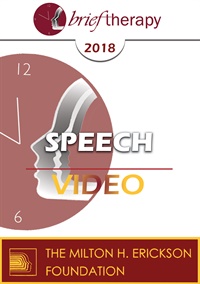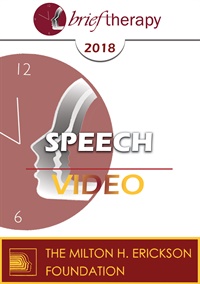
- Average Rating:
- Not yet rated
- Topic Areas:
- Special Topics | Hypnosis | Ericksonian Hypnosis and Therapy Techniques | Fundamentals of Hypnosis | Psychotherapy | Truisms | Age Regression | Hypnotic Phenomena | Post-Hypnotic Suggestion | Suggestion | Metaphors
- Categories:
- Brief Therapy Conference | Brief Therapy Conference 2018
- Faculty:
- Brent Geary, PhD
- Duration:
- 5:14:31
- Format:
- Audio Only
- Original Program Date:
- Dec 05, 2018
- Short Description:
- This workshop will provide participants with an introduction to the key concepts and techniques of practice in Ericksonian hypnosis. A brief biography of Erickson’s professional life will provide perspective on the extensive contributions he made to the fields of hypnosis and psychotherapy. Terminology of hypnosis will be explained and various approaches to induction will be described and demonstrated. The process of a typical hypnotic session will be outlined. Considerable attention will be afforded the hypnotic phenomena, the essential mechanisms in hypnotic therapy. Erickson’s landmark concepts of utilization and indirection will be explored with particular focus on the use of therapeutic anecdotes and metaphors.
- Price:
- $15.00 - Base Price
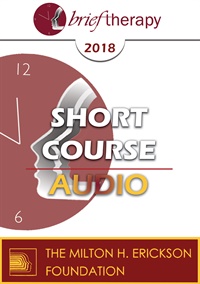
- Average Rating:
- Not yet rated
- Topic Areas:
- Short Courses | Brief Therapy | Psychotherapy
- Categories:
- Brief Therapy Conference | Brief Therapy Conference 2018
- Faculty:
- Melanie McGhee, LCSW
- Duration:
- 1:28:08
- Format:
- Audio Only
- Original Program Date:
- Dec 06, 2018
- Short Description:
- After a brief exploration of the six principles of Acceptance and Integration Training, participants will learn a simple method for helping clients recognize distorted thoughts AS distorted.
- Price:
- $15.00 - Base Price
Tags: Brief Therapy Psychotherapy
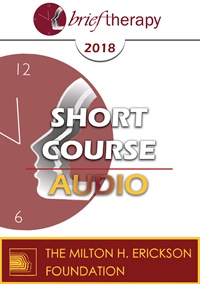
- Average Rating:
- Not yet rated
- Topic Areas:
- Short Courses | Dreamwork | Psychotherapy | Brief Therapy | Consciousness
- Categories:
- Brief Therapy Conference | Brief Therapy Conference 2018
- Faculty:
- Bruce Fordham, MA/CMHC
- Duration:
- 1:25:38
- Format:
- Audio Only
- Original Program Date:
- Dec 06, 2018
- Short Description:
- This workshop will provide a basic understanding of how to utilize dreamwork in psychotherapy, thereby providing an excellent alternative for patient care - especially when a patient's defenses are strong.
- Price:
- $15.00 - Base Price
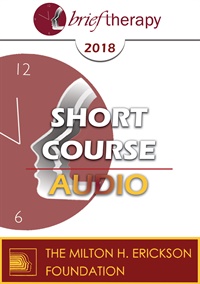
- Average Rating:
- Not yet rated
- Topic Areas:
- Short Courses | Brief Therapy | Art and Creativity | Psychotherapy | Solution Oriented Approach
- Categories:
- Brief Therapy Conference | Brief Therapy Conference 2018
- Faculty:
- George Ferrick, MA
- Duration:
- 1:24:31
- Format:
- Audio Only
- Original Program Date:
- Dec 06, 2018
- Short Description:
- This workshop will describe strategies and approaches adapted from brief and solution focused therapy. These enhanced mediation with creative ways to set a tone and reduce anxiety and resistance; to give voice to participants while getting to the heart of the matter; to unlock narrow positions, break through impasses, move to broader viewpoints, and co-create solutions.
- Price:
- $15.00 - Base Price
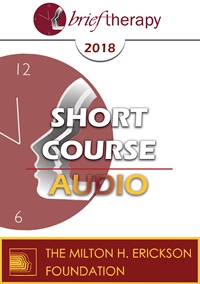
- Average Rating:
- Not yet rated
- Topic Areas:
- Short Courses | Humor | Psychotherapy | Brief Therapy | Relationships
- Categories:
- Brief Therapy Conference | Brief Therapy Conference 2018
- Faculty:
- Steven Sultanoff, Psychologist
- Duration:
- 1:18:02
- Format:
- Audio Only
- Original Program Date:
- Dec 06, 2018
- Short Description:
- Integrating therapeutic humor into psychotherapy is more than simply using humor with clients. This presentation will explore how and why integrating humor into clinical practice can be effective as well as assist clinicians to use humor with clinical awareness. Participants will learn a model of clinical humor that provides a foundation for the use of humor in psychotherapy and discover how humor (when purposely chosen as a clinical intervention) can be used as a relationship enhancing intervention, as well as a diagnostic and treatment tool.
- Price:
- $15.00 - Base Price
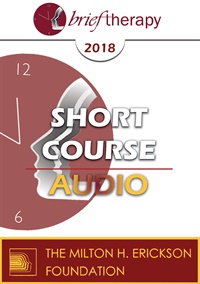
- Average Rating:
- Not yet rated
- Topic Areas:
- Short Courses | Psychotherapy | Awareness Integration Model | Brief Therapy | Anxiety | Depression
- Categories:
- Brief Therapy Conference | Brief Therapy Conference 2018
- Faculty:
- Foojan Zeine, Psy.D., MFT
- Duration:
- 1:16:41
- Format:
- Audio Only
- Original Program Date:
- Dec 06, 2018
- Short Description:
- The clinical method of the Awareness Integration model has evolved from Cognitive, emotional, Behavioral, body-oriented, and trauma releasing theories and has been researched with a diverse population with significant results toward minimizing Depression and Anxiety.
- Price:
- $15.00 - Base Price
Credit available - Click Here for more information
- Average Rating:
- Not yet rated
- Topic Areas:
- Speeches | Brief Therapy | Neuroscience | Psychotherapy | Therapist Development
- Categories:
- Brief Therapy Conference | Brief Therapy Conference 2018 | Online Continuing Education
- Faculty:
- Michael Yapko, PhD
- Course Levels:
- Master Degree or Higher in Health-Related Field
- Duration:
- 1:02:31
- Format:
- Audio and Video
- Original Program Date:
- Dec 09, 2018
- Short Description:
- Conventional wisdom can guide us but also confuse us when seemingly good pieces of advice contradict each other (e.g., “Look before you leap…BUT he who hesitates is lost”). How can someone know when to do this rather than do that? How can we help clients make better decisions in order to improve the quality of their lives? The fields of cognitive neuroscience and phenomenology have offered us many insights into decision-making processes and some of these will be discussed as they apply to the context of active, short-term psychotherapies.
- Price:
-
Sale is $29.00
price reduced from Base Price - $59.00
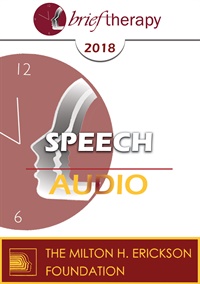
- Average Rating:
- Not yet rated
- Topic Areas:
- Speeches | Brief Therapy | Psychotherapy | Solution Oriented Approach
- Categories:
- Brief Therapy Conference | Brief Therapy Conference 2018
- Faculty:
- Elliott Connie, MA, LPC
- Duration:
- 59:30
- Format:
- Audio Only
- Original Program Date:
- Dec 09, 2018
- Short Description:
- The Solution Focused Approach is a widely accepted way of conducted psychotherapy sessions. Over the past 40 years this approach has come to be known for its brevity, pragmatism and positive stance. However, many inaccurate myths about this approach exist which impact many clinicians' ability to understand, and subsequently use, this approach. There is one misunderstanding that stands above all others, and this workshop will directly address this common misunderstanding while showing to not succumb to this idea and how to follow the true essence of Solution Focused work.
- Price:
- $15.00 - Base Price
Credit available - Click Here for more information
- Average Rating:
- Not yet rated
- Topic Areas:
- Speeches | Psychotherapy | Art and Creativity | Brief Therapy | Resources
- Categories:
- Brief Therapy Conference | Brief Therapy Conference 2018 | Online Continuing Education
- Faculty:
- Stephen Gilligan, PhD
- Course Levels:
- Master Degree or Higher in Health-Related Field
- Duration:
- 1:01:12
- Format:
- Audio and Video
- Original Program Date:
- Dec 09, 2018
- Short Description:
- Therapy is successful when clients are able to experience significantly changed realities. While the identification and transformation of symptoms is important in this regard, the activation of the client's creative capacity to make positive changes is even more important. This paper will explore how the 6-step model of Generative Psychotherapy provides a disciplined yet flexible process for helping clients claim and use their agency for creative change.
- Price:
-
Sale is $29.00
price reduced from Base Price - $59.00
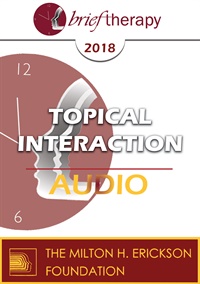
- Average Rating:
- Not yet rated
- Topic Areas:
- Topical Interactions | Brief Therapy | Psychotherapy | Hypnosis | Hypnotic Phenomena
- Categories:
- Brief Therapy Conference | Brief Therapy Conference 2018
- Faculty:
- Michael Yapko, PhD
- Duration:
- 1:00:04
- Format:
- Audio Only
- Original Program Date:
- Dec 08, 2018
- Short Description:
- This presentation will allow for a dialog with attendees regarding the merits of hypnosis, the ways it can be applied clinically, the differences between laboratory and clinical effects on hypnotic responsiveness, and other topics of interest regarding hypnosis.
- Price:
- $15.00 - Base Price
Please wait ...


